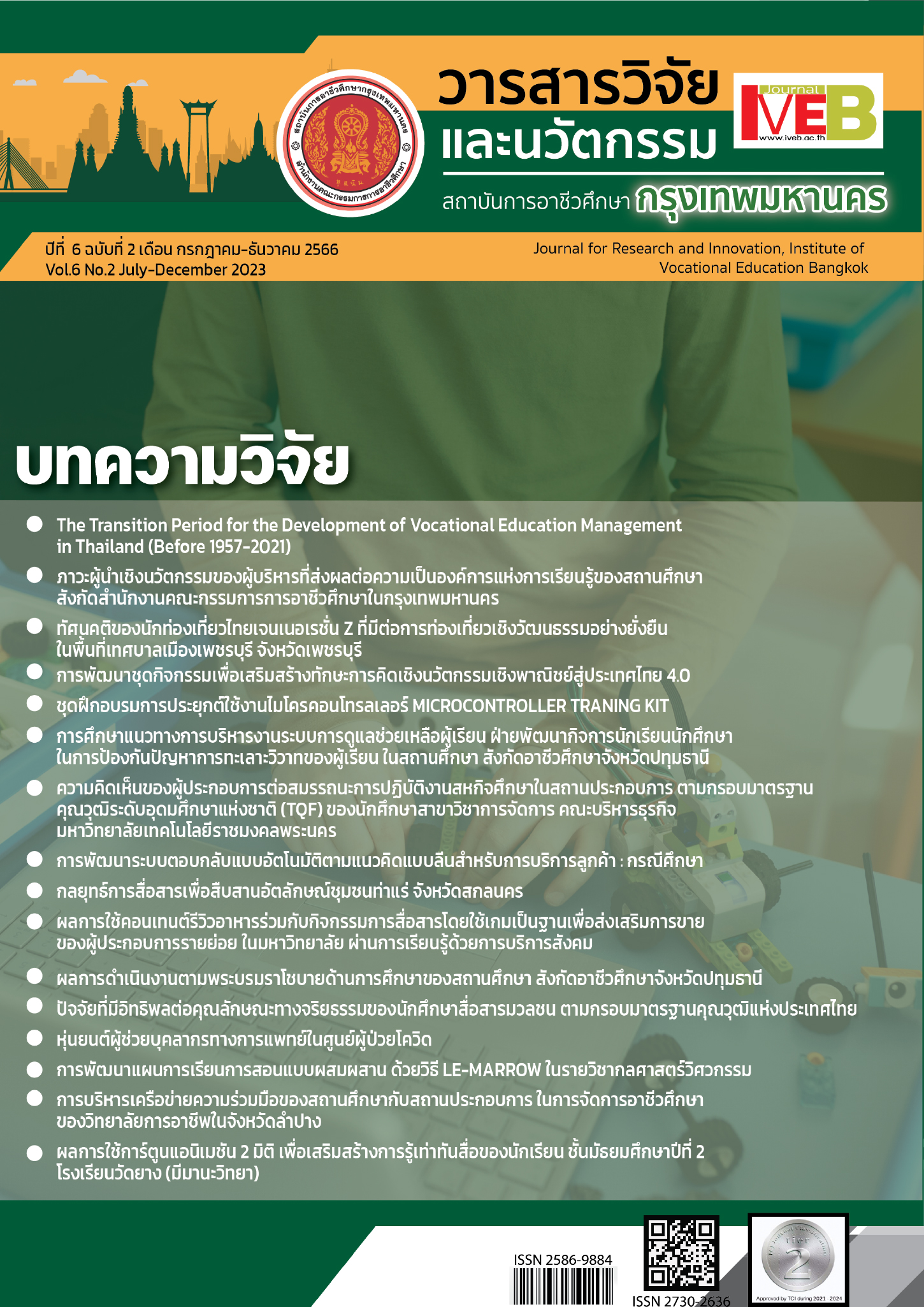ทัศนคติของนักท่องเที่ยวไทยเจนเนอเรชั่น Z ที่มีต่อการท่องเที่ยวเชิงวัฒนธรรมอย่างยั่งยืน ในพื้นที่เทศบาลเมืองเพชรบุรี จังหวัดเพชรบุรี
Main Article Content
บทคัดย่อ
การวิจัยนี้มีวัตถุประสงค์เพื่อเปรียบเทียบทัศนคติของนักท่องเที่ยวไทยเจนเนอเรชั่น 2 ที่มีต่อการท่องเที่ยวเชิงวัฒนธรรมอย่างยั่งยืน ในพื้นที่เทศบาลเมืองเพชรบุรี จังหวัดเพชรบุรี กลุ่มตัวอย่างที่ใช้คือ นักท่องเที่ยวไทยเจเนอเรชั่น 2 ที่เคยเดินทางไปท่องเที่ยวในพื้นที่เทศบาลเมืองเพชรบุรี จำนวน 400 คน เก็บข้อมูลด้วยแบบสอบถาม และวิเคราะห์ข้อมูลด้วยโปรแกรมสำเร็จรูป โดยใช้สถิติค่าร้อยละ ค่าเฉลี่ย ส่วนเบี่ยงเบนมาตรฐาน และทดสอบสมมติฐานด้วยค่า T-test และ One Way ANOVA
ผลการศึกษาพบว่า ทัศคติของนักท่องเที่ยวไทยเจเนอเรชั่น Z ที่มีต่อการท่องเที่ยวเชิงวัฒนธรรมอย่างยั่งยืน ในพื้นที่เทศบาลเมืองเพชรบุรี จังหวัดเพชรบุรี โดยรวมอยู่ในระดับมากที่สุดและเมื่อพิจารณาความคิดเห็นเกี่ยวกับแนวคิดการท่องเที่ยวที่มีต่อการท่องเที่ยวเชิงวัฒนธรรมอย่างยั่งยืน ในพื้นที่เทศบาลเมืองเพชรบุรี จังหวัดเพชรบุรี ด้านสิ่งแวดล้อม เศรษฐกิจ สังคม/วัฒนธรรม โดยรวมอยู่ในระดับมากที่สุด และผลการทดสอบสมมติฐานพบว่า กลุ่มตัวอย่างที่มีอายุ อาชีพ สถานภาพ ระดับการศึกษา และรายได้ แตกต่างกัน มีทัศคติต่อการท่องเที่ยวเชิงวัฒนธรรมอย่างยั่งยืน ในพื้นที่เทศบาลเมืองเพชรบุรี จังหวัดเพชรบุรีแตกต่างกัน ที่ระดับนัยสำคัญทางสถิติที่ระดับ 0.05 แต่กลุ่มตัวอย่างที่มีเพศแตกต่างกัน ทัศคติต่อการท่องเที่ยวเชิงวัฒนธรรมอย่างยั่งยืนในพื้นที่เทศบาลเมืองเพชรบุรี จังหวัดเพชรบุรีไม่แตกต่างกัน
Article Details

อนุญาตภายใต้เงื่อนไข Creative Commons Attribution-NonCommercial-NoDerivatives 4.0 International License.
เอกสารอ้างอิง
ชัยวุฒิ ชัยฤกษ์ ใบเฟิร์น วงษ์บัวงาม และจักรชัย ยิ้มงาม. (2564). พฤติกรรมการท่องเที่ยวโดยรถจักรยานยนต์: กรณีศึกษาผู้ขับขี่รถจักรยานยนต์ในกรุงเทพมหานคร. วารสารศิลปศาสตร์ (วังนางเลิ้ง) มหาวิทยาลัยเทคโนโลยีราชมงคลพระนคร. ปีที่ 1 ฉบับที่ 1. 108-125.
ชัยยุทธ ถาวรานุรักษ์. (2564). ความรู้พื้นฐานเกี่ยวกับอุตสาหกรรมการท่องเที่ยว. อ่างทอง: วรศิลป์การพิมพ์ 89.
ธนัณชัย สิงห์มาตย์. (2555). วิกฤตหรือโอกาสการท่องเที่ยวเชิงวัฒนธรรมกับการก้าวเข้าสู่ประชาคมเศรษฐกิจอาเซียน. [ออนไลน์]. [สืบค้นเมื่อวันที่ 8 เมษายน 2566]. จาก https://www.gotoknow.org/posts/500987.
ภคอัศม์ โปษะกฤษณะ. (2566). การท่องเที่ยวเชิงวัฒนธรรมในชุมชนอย่างยั่งยืนภายหลังสถานการณ์ โควิด-19. วารสาร มจร.หริภุญชัยปริทรรศน์. ปีที่ 7 ฉบับที่ 2. 282-292.
Cochran, W.G. (1953). Sampling Techiques. New York : John Wiley & Sons. Inc.
Cronbach,L. J. (1951). “Coefficient Alphaand theInternalStructureofTests”. Psychometrika. 16(3), 297-334.
บุญชม ศรีสะอาด. (2560). การวิจัยเบื้องต้น. พิมพ์ครั้งที่ 10. กรุงเทพฯ : สุวีริยาสาส์น.
จีณัสมา ศรีหิรัญ, กมนภา หวังเขื่อนกลาง, รวิภา ในเถา, สมศักดิ์ ตลาดทรัพย์. (2563). การจูงใจนักท่องเที่ยวเจเนอเรชันแซดด้วยองค์ประกอบทางการท่องเที่ยว เพื่อเข้าร่วมประเพณีฮีตสิบสองใน จังหวัดขอนแก่น. วารสารบัณฑิตแสงโคมคา ปีที่ 5 ฉบับที่ 1. 32 – 50.
Marketeer. (2019). [ออนไลน์]. ธุรกิจท่องเที่ยวว่าไง เด็กไทยนิยมเที่ยวเชิงอนุรักษ์มากขึ้น. [สืบค้นเมื่อวันที่ 26พฤษภาคม 2566]. จาก https://marketeeronline.co/archives/115375
พงศ์เสวก อเนกจำนงค์พร. (2565). แรงจูงใจในการท่องเที่ยวเชิงวัฒนธรรมของประชากรรุ่นแซดวารสารมนุษยศาสตร์และสังคมศาสตร์ มหาวิทยาลัยพะเยา ปีที่ 10 ฉบับที่ 1 . 280-294.
SCB Economic Intelligence Center. (2565). [ออนไลน์]. ส่องพฤติกรรม นักท่องเที่ยวแต่ละสาย.[สืบค้นเมื่อวันที่ 26 พฤษภาคม 2566]. จาก https://www.scbeic.com/th/detail/file/product/8602/getdypugcp/EIC-In-Focus_Consumer-survey-report_Travel-Part-2_20221026.pdf
เสรี วงษ์มณฑา. (2564). การท่องเที่ยวเชิงสร้างสรรค์ : นวัตกรรมการเคลื่อนขยับของการท่องเที่ยวเชิงวัฒนธรรม. วารสารศิลปศาสตร์ (วังนางเลิ้ง) มหาวิทยาลัยเทคโนโลยีราชมงคลพระนคร. ปีที่ 1 ฉบับที่ 1. 1-24.


